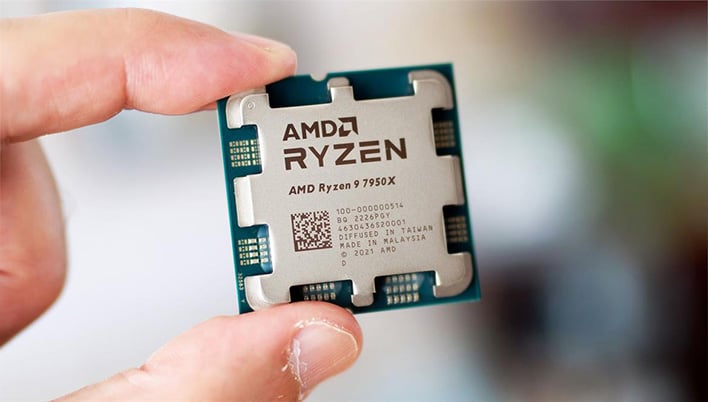Ryzen 9 7950X Seen Falsely Running At 6.3GHz Due To A Quirky Windows Bug

As it turns out, this bug is related to a decade-old timing issue plaguing Windows operating systems that occurs when an internal Windows clock glitches out and reports wrong values. This will cause 3rd party monitoring programs and benchmarking applications to misinterpret the data being fed to them, thanks to incorrect values reported by the timer. Coined the "RTC Bug", the glitch has been a massive problem in the overclocking community since its inception in Windows 8. Overclocking databases such as HWBot have been forced to outright ban all overclocking submissions that don't take the proper precautions, to prevent the bug skewing results.
The bug has taken on multiple forms since its inception in Windows 8, but the main problem stems from the LAPIC timer found in Windows 8, 10, and 11. This timer is known to be highly volatile based on CPU BCLK and can show false readings if the base clock is manually overclocked or underclocked beyond or below the standard 100MHz frequency. This is the only explanation of how this 7950X was able to achieve its artificially inflated clock speeds and benchmark results. To duplicate the bug, the viewer pointed out that the CPU needs to be running at its maximum turbo frequency as the system is shutting down. This bug must somehow be interrupting a function related to the system's base clock, which is either causing the system's clock speed to physically change or cause the LAPIC timer to report false information.
Either way, this appears to be an AGESA code error with the Ryzen 7000 platform, since the technique involved in re-creating this bug has only been discovered on the Ryzen 9 7950X so far. This isn't surprising considering Ryzen 7000's teething issues have been extensive, revolving around immature BIOS versions that can cause CPU instability, DDR5 instability, bootup issues, and even cause sleep mode to disappear completely with EXPO enabled – the latter of which I speak from personal experience. Hopefully, AMD gets to the bottom of this issue soon and provides a fix with a new AGESA microcode update before HWBot boots all of its Ryzen 7000 submissions off the site.
Either way, this appears to be an AGESA code error with the Ryzen 7000 platform, since the technique involved in re-creating this bug has only been discovered on the Ryzen 9 7950X so far. This isn't surprising considering Ryzen 7000's teething issues have been extensive, revolving around immature BIOS versions that can cause CPU instability, DDR5 instability, bootup issues, and even cause sleep mode to disappear completely with EXPO enabled – the latter of which I speak from personal experience. Hopefully, AMD gets to the bottom of this issue soon and provides a fix with a new AGESA microcode update before HWBot boots all of its Ryzen 7000 submissions off the site.

